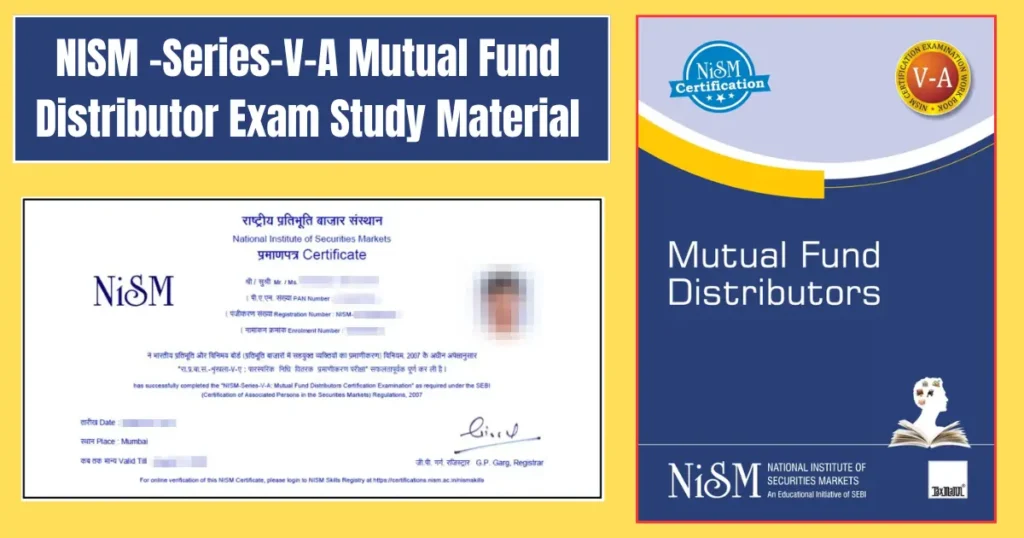About V-A Mutual Fund Distributors NISM Certificates Exam
NISM-Series VA: Mutual Fund Distributors Certification Exam (NISM Exam) is conducted by the National Institute of Securities Market (NISM).
You do not get ARN number until you pass the NISM Certification Exam, when you pass this exam you can become an agent of any mutual fund company.
The main objective of NISM exam is to create a common minimum knowledge standard for all candidates involved in the sale and distribution of all types of schemes of mutual funds.
It includes individual mutual fund distributors, employees of organizations engaged in the sale and distribution of mutual funds and employees of asset management companies (AMCs), mainly engaged in the sale and distribution of mutual funds etc.
NISM-Series-VA: The Mutual Fund Distributors Certification Exam aims to promote quality sales and distribution-related support services in the mutual fund industry.
V-A Mutual Fund Distributors Exam Road map
NISM Certifications Eligibility Criteria
Mode to Appear in the NISM Exam
How Much NISM Certification Fees to be submitted?
What is the Validity of the NISM Certificate?
NISM Certification Exam Pattern
NISM Series VA – Name of Module
How to Enroll for the NISM Exam?
NISM Certifications Exam Syllabus
NISM Exam Study Material
Become a Mutual Fund Distributor
Frequently Asked Questions (FAQs)
NISM Certifications Eligibility Criteria?
As per the guidelines given by the National Institute of Securities Market (NISM)
Any Indian individual who is 18 years of age and has passed at least 10th class can apply for the NISM exam and become a mutual fund distributor/advisor.
Note – There is no educational qualification listed as per Association of Mutual Funds (AMFI) website.
How to Appear in The NISM Mutual Fund Distributor Exam
According to the information on the official website of The Association of Mutual Funds (AMFI), anyone can take the exam in Hindi and English.
If you want to take the NISM exam to become a mutual fund distributor in Hindi language, then you will have to take this exam offline and to take this exam in English, you can take this exam both online and offline.
How Much NISM Exam Fee do I have to pay?
You have to pay Rs 1,500/- as an NISM exam fee online while registering for the NISM Mutual Fund Distributor Exam.
You can pay for the NISM exam online using a credit card/debit card or net banking and the UPI app.
What is the validity of the NISM certificate?
As per NISM details available on the Association of Mutual Funds (AMFI) website, the certificate of this exam is valid for around 3 years.
NISM Exam Pattern?
There will be 100 Questions in This Exam
Each Question will carry 1 mark (Maximum Marks 100)
You need to score at least 50% marks to pass this exam
Note: – There is no Negative Marking in This Exam
Note: Exam Passing Certificate will be issued to only those Candidates who have Furnished their Income Tax Permanent Account Number (PAN Card Number) in their registration details.
How to Enroll For The NISM Exam?
For this, you have to register on the official website of NISM and then Verify your email.
Complete your profile for NISM Registration. For this you will need a passport size photo in JPG format, Aadhar card and PAN card and scanned copy of 10th class mark sheet.
Note:– The size of all Your documents should not Exceed 1MB.
When you complete the Registration and verification of the NISM exam, your profile will be approved within 3 days.
To book NISM Series V-A exam, log in to the website (available in Hindi and English language).
To book the exam set – select your city, choose your time slot and pay Rs 1,500 for this exam.
If you want to take this exam online from your home, then choose the location online.
After paying the exam fee, download the syllabus of your exam from the NISM portal and study for this exam.
If you pass this exam, then you have to apply to Camsindia for your ARN number.
Tips: Always book the exam after 2 weeks so that you can prepare well for the exam.
NISM Exam V-A Mutual Fund Distributors Syllabus
To pass the NISM exam you must understand the NISM exam syllabus thoroughly. These are the main syllabus topics included in the NISM exam.
Syllabus Outline with Weightages ( NISM PDF )
Unit No.
Unit Name
Weightage
Unit 1
Investment Landscape
8
Unit 2
Concept & Role of a Mutual Fund
6
Unit 3
Legal Structure of Mutual Funds in India
4
Unit 4
Legal and Regulatory Framework
10
Unit 5
Scheme Related Information
10
Unit 6
Fund Distribution and Channel Management Practices
6
Unit 7
Net Asset Value, Total Expense Ratio and Pricing of units
8
Unit 8
Taxation
4
Unit 9
Investor Services
15
Unit 10
Risk, Return and Performance of Funds
7
Unit 11
Mutual Fund Scheme Performance
7
Unit 12
Mutual Fund Scheme Selection
15
CHAPTER 1: Investment Landscape 
1.1 Investors and their Financial Goals.
1.2 Savings or Investments?.
1.3 Different Asset Classes…
1.4 Investment Risks.
1.5 Risk Measures and Management Strategies.
1.6 Behavioural Biases in Investment Decision Making.
1.7 Risk Profiling.
1.8 Understanding Asset Allocation.
1.9 Do-it-yourself versus Taking Professional Help.
CHAPTER 2: Concept And Role Of A Mutual Fund 
1.1 Saving or Investments.
1.2 Different Asset Classes.
1.3 Four Broad Financial Needs.
1.4 Different Types of Financial Goals.
1.5 Role Of Mutual Funds In Achieving Different Financial Goals.
Chapter 3: Legal Structure Of Mutual Funds In India 
2.1 Concept of a Mutual Fund.
2.2 Classification Of Mutual Funds.
2.3 Growth of the Mutual Fund Industry in India.
Chapter 4: Legal And Regulatory Framework ![]()
3.1 Structure of Mutual Funds in India.
3.2 Key Constituents of a Mutual Fund.
3.3 Organization Structure of Asset Management Company.
3.4 Role and Support function of Service Providers.
3.5 Role and Function of AMFI.
Chapter 5: Scheme Related Information ![]()
4.1 Role of Regulators in India.
4.2 Role of Securities and Exchange Board of India.
4.3 Due Diligence Process by AMCs for Distributors of Mutual Funds..
4.4 Investor Grievance Redress Mechanism.
4.5 AMFI Code of Conduct for intermediaries.
Chapter 6: Fund Distribution & Channel Management Practices ![]()
5.1 Mandatory Documents.
5.2 Non-Mandatory Disclosures.
Chapter 7: Net Asset Value, Total Expense Ratio & Pricing Of Units ![]()
6.1 The role and importance of mutual fund distributors..
6.2 Different kinds of mutual fund distributors
6.3 Modes of distribution.
6.4 Pre-requisites to become Distributor of a Mutual Fund.
6.5 Revenue for a mutual fund distributor
6.6 Commission Disclosure mandated by SEBI
6.7 Due Diligence Process by AMCs for Distributors of Mutual Funds..
6.8 Difference between distributors and investment Advisors.
6.9 Nomination facilities to Agents/Distributors and Payment of Commission to Nominee
6.10 Change of distributor.
8.1 Applicability of taxes in respect of mutual funds.
8.2 Capital Gains.
8.3 Dividend income (IDCW option).
8.4 Stamp Duty on Mutual Fund Units.
8.5 Setting off of Capital Gains and Losses under Income Tax Act.
8.6 Securities Transaction Tax.
8.7 Tax benefit under Section 80C of the Income Tax Act.
8.8 Tax Deducted at Source.
8.9 Applicability of GST.
9.1 The NFO process.
9.2 New Fund Offer Price/On-going Offer Price for subscription.
9.3 Investment Plans and Services.
9.4 Allotment of Units to the Investor.
9.5 Account statements for investments.
9.6 Mutual Fund Investors.
9.7 Filling the Application Form for Mutual Funds.
9.8 Financial Transactions with Mutual Funds.
9.9 Cut-off Time and Time Stamping.
9.10 KYC Requirements for Mutual Fund Investors.
9.11 Systematic Transactions.
9.12 Operational aspects of Systematic Transactions.
9.13 Non-Financial Transactions in Mutual Funds.
9.14 Change in Status of Special Investor Categories.
9.15 Investor transactions-turnaround times.
Chapter 10: Risk, Return And Performance Of Funds ![]()
10.1 General and Specific Risk Factors.
10.2 Factors that affect mutual fund performance.
10.3 Drivers of Returns and Risk in a Scheme.
10.4 Measures of Returns.
10.5 SEBI Norms regarding Representation of Returns by Mutual Funds in India.
10.6 Risks in fund investing with a focus on investors.
10.7 Measures of Risk.
10.8 Certain Provisions with respect to Credit risk.
Chapter 11: Mutual Fund Scheme Performance ![]()
11.1 Benchmarks and Performance.
11.2 Price Return Index or Total Return Index.
11.3 Basis of Choosing an appropriate performance benchmark.
11.4 Benchmarks for equity schemes.
11.5 Benchmarks for Debt Schemes.
11.6 Benchmarks for Other Schemes.
11.7 Quantitative Measures of Fund Manager Performance.
11.8 Tracking Error.
11.9 Scheme Performance Disclosure.
Chapter 12: Mutual Fund Scheme Selection ![]()
12.1 Scheme Selection based on Investor needs, preferences and risk-profile.
12.2 Risk levels in mutual fund schemes..
12.3 Scheme Selection based on investment strategy of mutual funds
12.4 Selection of Mutual Fund scheme offered by different AMCs or within the scheme category
12.5 Selecting options in mutual fund schemes.
12.6 Do’s and Don’ts while selecting mutual fund schemes
Appendix 1: Fifth Schedule of Securities and Exchange Board of India (Mutual Funds) Regulations, 1996 (Regulations 18(22), 25(16), 68(h)]..
Appendix 2: AMFI Code of Ethics
Appendix 3: AMFI’s Code of Conduct for Intermediaries of Mutual Funds.
Appendix 4: Additional knowledge resources.
People also Ask NISM Mutual Fund Exam FAQ
How difficult is NISM mutual fund exam?
Yes, it is a very hard exam. If you study the syllabus of this exam well then you can pass this exam in the first attempt.
What is the passing percentage for NISM mutual fund Distributor exam?
The passing percentage of this exam is 50%. You will get 100 questions in this exam and you will have to answer 50 of them correctly.
How to clear NISM mutual fund exam?
I am giving you some tips to pass this exam. If your English is not good, then while submitting the exam form, select the exam in Hindi. Read the exam syllabus 1 week in advance and you will be able to pass this exam very easily.
































